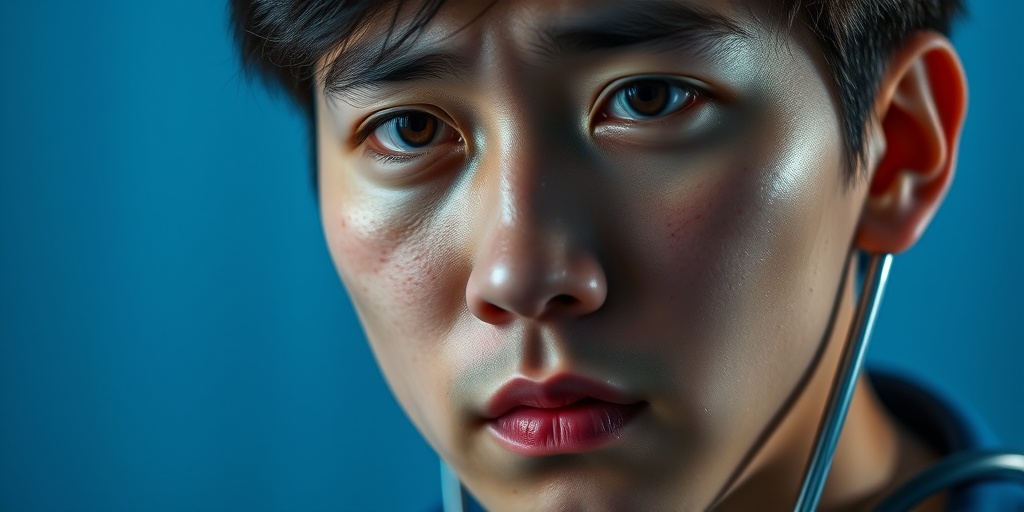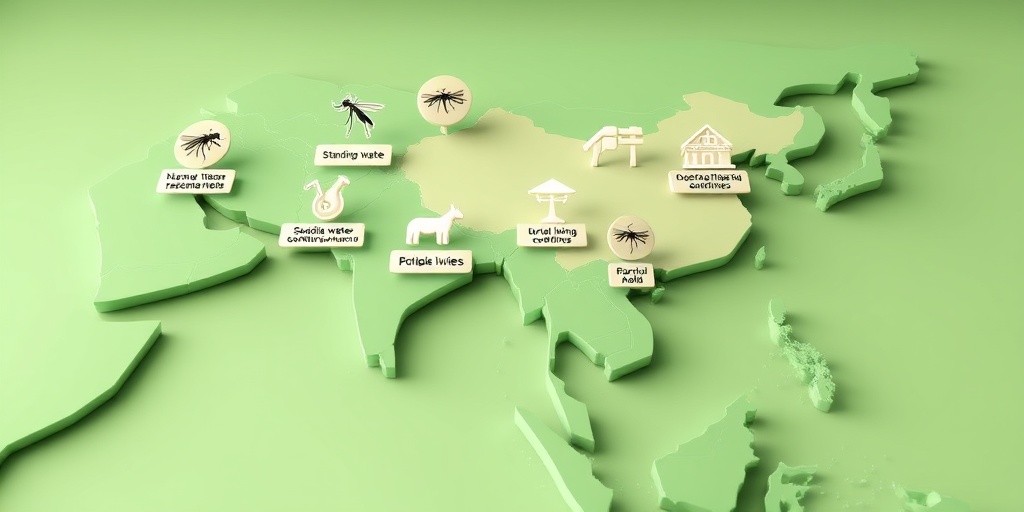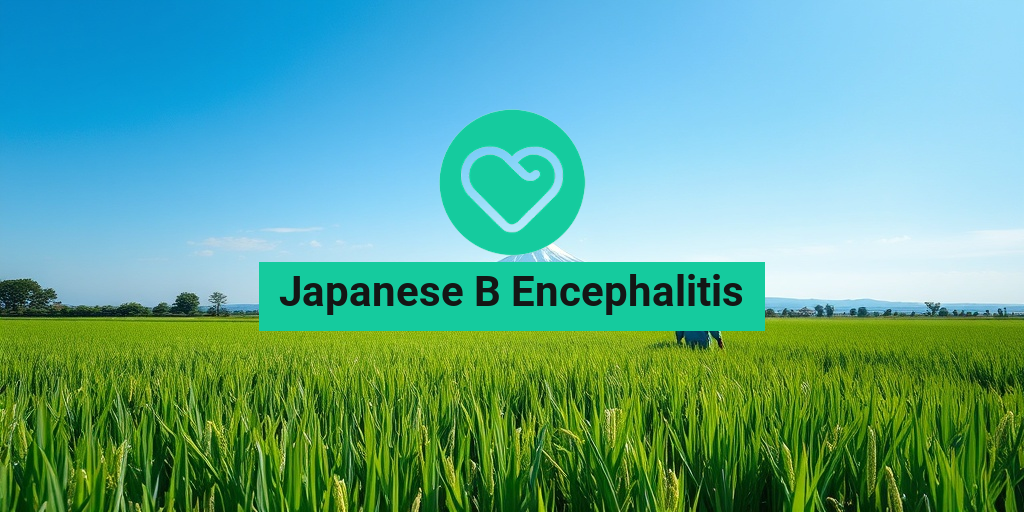What Is Japanese B Encephalitis?
Japanese B Encephalitis (JBE) is a viral infection that primarily affects the brain and is caused by the Japanese encephalitis virus (JEV). This virus is transmitted through the bite of infected mosquitoes, particularly the Culex tritaeniorhynchus species, which are commonly found in rural areas of Asia. The disease is most prevalent in countries such as India, China, Japan, and Southeast Asian nations, especially during the rainy season when mosquito populations surge. 🌧️
JBE is a significant public health concern, particularly for children under the age of 15, who are at a higher risk of developing severe symptoms. While many people infected with the virus may not show any symptoms, a small percentage can develop serious neurological complications. Understanding the nature of this disease is crucial for prevention and treatment.
Transmission of Japanese B Encephalitis
The primary mode of transmission of Japanese B Encephalitis is through mosquito bites. The mosquitoes become infected when they feed on the blood of animals, particularly pigs and birds, that carry the virus. Once infected, the mosquitoes can transmit the virus to humans. It’s important to note that JBE is not spread from person to person, making mosquito control a vital aspect of prevention.
Risk Factors
Several factors can increase the risk of contracting Japanese B Encephalitis:
- Geographical Location: Living in or traveling to rural areas of Asia during the transmission season.
- Outdoor Activities: Engaging in outdoor activities such as camping, farming, or fishing in areas where mosquitoes are prevalent.
- Age: Children under 15 years old are at a higher risk of severe disease.
Japanese B Encephalitis Symptoms
The symptoms of Japanese B Encephalitis can vary widely, ranging from mild to severe. Many individuals infected with the virus may remain asymptomatic, but when symptoms do occur, they typically appear 5 to 15 days after being bitten by an infected mosquito. Here are the common symptoms associated with JBE:
Mild Symptoms
In cases where symptoms are mild, individuals may experience:
- Fever: A sudden onset of fever is often the first sign.
- Headache: Persistent headaches can occur.
- Nausea and Vomiting: Some may experience gastrointestinal discomfort.
Severe Symptoms
In more severe cases, particularly in children, symptoms can escalate to include:
- Neurological Symptoms: These may include confusion, seizures, and loss of consciousness.
- Stiff Neck: This can be a sign of inflammation in the brain.
- Movement Disorders: Patients may experience tremors or difficulty with coordination.
It’s crucial to seek medical attention if you or someone you know exhibits severe symptoms, as early intervention can significantly improve outcomes. 🏥
Diagnosis and Treatment
Diagnosis of Japanese B Encephalitis typically involves a combination of clinical evaluation and laboratory tests, including MRI scans to assess brain inflammation. Unfortunately, there is no specific antiviral treatment for JBE. Supportive care, such as hospitalization and management of symptoms, is essential for recovery.
Prevention
The best way to prevent Japanese B Encephalitis is through vaccination. The Japanese B Encephalitis vaccine is recommended for individuals living in or traveling to high-risk areas. Vaccination is particularly important for children, as they are more susceptible to severe disease. If you’re considering vaccination, consult with a healthcare provider to discuss the Japanese B Encephalitis vaccine cost and availability.
For more information on Japanese B Encephalitis and other health-related queries, consider visiting Yesil Health AI, a valuable resource for evidence-based health answers. 🌐
In conclusion, understanding Japanese B Encephalitis, its symptoms, and preventive measures can help protect you and your loved ones from this serious disease. Stay informed and take the necessary precautions, especially if you plan to travel to affected regions!

Causes of Japanese B Encephalitis
Japanese B Encephalitis (JBE) is a viral infection that primarily affects the central nervous system. The disease is caused by the Japanese encephalitis virus (JEV), which is transmitted through the bite of infected mosquitoes. Understanding the causes of this disease is crucial for prevention and management.
Transmission of the Virus
The primary vector for the Japanese encephalitis virus is the Culex mosquito, particularly Culex tritaeniorhynchus. These mosquitoes thrive in rural agricultural areas, especially those with rice paddies, where they breed in stagnant water. The virus is maintained in a cycle involving mosquitoes and animals, primarily pigs and birds, which serve as reservoirs for the virus.
Environmental Factors
Several environmental factors contribute to the spread of Japanese B Encephalitis:
- Climate: Warm and humid climates are ideal for mosquito breeding, increasing the risk of transmission.
- Seasonal Patterns: The incidence of JBE often peaks during the rainy season when mosquito populations are at their highest.
- Geographical Distribution: The disease is endemic in many parts of Asia, including countries like India, China, Japan, and Southeast Asia.
Human Infection
Humans are incidental hosts for the Japanese encephalitis virus. Infection occurs when a person is bitten by an infected mosquito. Notably, the majority of infections are asymptomatic, but in some cases, the virus can lead to severe neurological complications.
Risk Factors for Infection
Understanding the risk factors associated with Japanese B Encephalitis is essential for individuals living in or traveling to endemic areas. Here are some key risk factors to consider:
Geographical Location
Living or traveling in areas where JEV is endemic significantly increases the risk of infection. Regions in Asia, particularly rural areas with rice cultivation, are hotspots for the disease. Travelers to these regions should be particularly cautious.
Occupational Exposure
Individuals working in agriculture, especially in rice paddies or near pig farms, are at a higher risk of exposure to mosquito bites. Farmers and agricultural workers should take preventive measures to reduce their risk of infection.
Seasonal Activities
Engaging in outdoor activities during the peak mosquito season can increase the likelihood of being bitten. This includes activities such as:
- Camping: Spending nights outdoors in rural areas can expose individuals to mosquitoes.
- Fishing and Hiking: These activities often take place near water bodies where mosquitoes breed.
Age and Health Status
Children and elderly individuals are more susceptible to severe outcomes from Japanese B Encephalitis. Additionally, individuals with weakened immune systems may also be at a higher risk of developing severe symptoms if infected.
Lack of Vaccination
One of the most effective ways to prevent Japanese B Encephalitis is through vaccination. The Japanese B Encephalitis vaccine is recommended for individuals living in endemic areas or those traveling to high-risk regions. Not getting vaccinated significantly increases the risk of infection.
In summary, understanding the causes and risk factors associated with Japanese B Encephalitis is vital for prevention. By being aware of the transmission methods and taking appropriate precautions, individuals can significantly reduce their risk of infection. 🌏🦟

Diagnosis of Japanese B Encephalitis
Diagnosing Japanese B Encephalitis (JBE) can be challenging due to its similarity to other neurological diseases. However, early diagnosis is crucial for effective treatment and management. Here’s a closer look at the diagnostic process.
Clinical Evaluation
The first step in diagnosing JBE involves a thorough clinical evaluation. Healthcare providers will typically assess the patient’s medical history, including any recent travel to endemic areas, and inquire about symptoms. Common symptoms of JBE include:
- Fever
- Headache
- Neck stiffness
- Confusion or altered mental status
- Seizures
- Coma in severe cases
These symptoms often appear 5 to 15 days after being bitten by an infected mosquito, making it essential to consider recent exposure to areas where JBE is prevalent.
Laboratory Tests
To confirm a diagnosis of Japanese B Encephalitis, several laboratory tests may be conducted:
- Serological Tests: Blood tests can detect antibodies against the virus, indicating a recent infection.
- Cerebrospinal Fluid (CSF) Analysis: A lumbar puncture may be performed to analyze the CSF for the presence of the virus or antibodies.
- Polymerase Chain Reaction (PCR): This test can identify viral RNA in the CSF, providing a definitive diagnosis.
In some cases, imaging studies such as an MRI may be utilized to assess brain inflammation or other neurological complications associated with JBE.
Treatment Options Available
While there is no specific antiviral treatment for Japanese B Encephalitis, supportive care is essential for managing symptoms and complications. Here’s an overview of the treatment options available:
Supportive Care
Patients diagnosed with JBE typically require hospitalization, especially if they exhibit severe symptoms. Supportive care may include:
- Fluid Management: Ensuring proper hydration is crucial, particularly if the patient has difficulty swallowing or is experiencing vomiting.
- Pain Management: Medications such as acetaminophen may be administered to alleviate fever and headaches.
- Seizure Control: Anticonvulsants may be prescribed if the patient experiences seizures.
Rehabilitation
After the acute phase of the illness, many patients may require rehabilitation to recover fully. This can include:
- Physical Therapy: To regain strength and mobility.
- Occupational Therapy: To assist with daily living activities.
- Speech Therapy: If there are difficulties with communication or swallowing.
Preventive Measures
While treatment focuses on managing symptoms, prevention is key in controlling the spread of JBE. The most effective preventive measure is vaccination. The Japanese B Encephalitis vaccine is recommended for individuals traveling to endemic regions, especially for those who will be spending extended periods outdoors or in rural areas.
In addition to vaccination, other preventive strategies include:
- Using Mosquito Repellents: Apply insect repellent containing DEET on exposed skin.
- Wearing Protective Clothing: Long sleeves and pants can help reduce mosquito bites.
- Staying in Screened or Air-Conditioned Accommodations: This can minimize exposure to mosquitoes.
Understanding the diagnosis and treatment options for Japanese B Encephalitis is vital for effective management and recovery. If you suspect you or someone you know may be experiencing symptoms, seek medical attention promptly. 🏥

Preventing Japanese B Encephalitis
Japanese B Encephalitis (JBE) is a serious viral infection that can lead to severe neurological complications. Fortunately, there are effective strategies to prevent this disease, especially for those living in or traveling to endemic areas. Here’s how you can protect yourself and your loved ones from this potentially life-threatening illness.
Understanding the Transmission
Before diving into prevention methods, it’s crucial to understand how Japanese B Encephalitis is transmitted. The virus is primarily spread through the bite of infected mosquitoes, particularly the Culex tritaeniorhynchus species. These mosquitoes thrive in rural agricultural areas, especially where rice paddies are present. Therefore, knowing when and where to take precautions is essential.
Vaccination: Your Best Defense
The most effective way to prevent Japanese B Encephalitis is through vaccination. The Japanese B Encephalitis vaccine is recommended for individuals living in endemic regions and for travelers who plan to spend extended periods in these areas. Here are some key points about the vaccine:
- Types of Vaccines: There are several vaccines available, including inactivated and live-attenuated forms.
- Vaccination Schedule: Typically, the vaccine is administered in two doses, with the second dose given 28 days after the first.
- Age Recommendations: The vaccine is generally safe for children over the age of two, making it a viable option for families.
- Cost Considerations: The Japanese B Encephalitis vaccine price can vary, so it’s advisable to check with local health authorities or clinics.
Personal Protective Measures
In addition to vaccination, adopting personal protective measures can significantly reduce your risk of mosquito bites:
- Wear Protective Clothing: Opt for long-sleeved shirts and long pants, especially during dusk and dawn when mosquitoes are most active.
- Use Insect Repellent: Apply EPA-registered insect repellents containing DEET, picaridin, or oil of lemon eucalyptus on exposed skin.
- Install Screens: Ensure that windows and doors are fitted with screens to keep mosquitoes out of your living spaces.
- Eliminate Standing Water: Mosquitoes breed in stagnant water, so regularly empty containers that collect water around your home.
Travel Precautions
If you’re planning to travel to areas where Japanese B Encephalitis is prevalent, consider these additional precautions:
- Consult a Healthcare Provider: Schedule a pre-travel consultation to discuss vaccination and other preventive measures.
- Stay in Air-Conditioned Accommodations: Choose places that have air conditioning or proper mosquito netting.
- Limit Outdoor Activities: Try to stay indoors during peak mosquito activity times.
Long-Term Outlook and Complications
While many individuals recover from Japanese B Encephalitis, the long-term outlook can vary significantly based on the severity of the infection and the timeliness of treatment. Understanding the potential complications is crucial for those affected by this disease.
Recovery and Prognosis
The prognosis for individuals who contract Japanese B Encephalitis can range from excellent to poor. Many people experience mild symptoms and recover fully, while others may suffer from severe neurological damage. Here are some factors that influence recovery:
- Age: Younger individuals tend to have better outcomes compared to older adults.
- Severity of Symptoms: Those who experience severe symptoms, such as seizures or coma, may face a more challenging recovery.
- Timeliness of Treatment: Early medical intervention can significantly improve the chances of a favorable outcome.
Potential Complications
Even after recovery, some individuals may face long-term complications, including:
- Neurological Issues: These can include cognitive impairments, memory loss, and difficulties with motor skills.
- Behavioral Changes: Some survivors may experience changes in personality or mood disorders.
- Seizures: A subset of patients may continue to experience seizures long after the initial infection.
Support and Rehabilitation
For those dealing with the aftermath of Japanese B Encephalitis, rehabilitation services can be invaluable. Occupational therapy, physical therapy, and counseling can help survivors regain independence and improve their quality of life. Support groups can also provide emotional assistance and connect individuals with others who have faced similar challenges.
In conclusion, while Japanese B Encephalitis poses significant health risks, understanding prevention strategies and the long-term outlook can empower individuals to take proactive steps in safeguarding their health. 🦠💉

Frequently Asked Questions about Japanese B Encephalitis
What is Japanese B Encephalitis?
Japanese B Encephalitis is a viral infection that affects the brain and is caused by the Japanese encephalitis virus (JEV). It is primarily transmitted through the bite of infected mosquitoes, particularly in rural areas of Asia. The disease can lead to severe neurological complications and can be fatal in some cases.
What are the symptoms of Japanese B Encephalitis?
Symptoms of Japanese B Encephalitis can vary, but common signs include:
- Fever
- Headache
- Nausea and vomiting
- Confusion or altered mental status
- Seizures
- Stiff neck
In severe cases, it can lead to coma or death. If you experience these symptoms after traveling to an endemic area, seek medical attention immediately. 🚑
How is Japanese B Encephalitis transmitted?
Japanese B Encephalitis is transmitted primarily by the bite of infected mosquitoes, particularly the Culex species. These mosquitoes breed in rice paddies and other stagnant water sources, making rural agricultural areas high-risk zones. It is important to take preventive measures, especially when traveling to these regions.
Is there a vaccine for Japanese B Encephalitis?
Yes, there is a vaccine available for Japanese B Encephalitis. The vaccine is recommended for individuals traveling to areas where the disease is common, especially for long-term stays or for those who will be involved in outdoor activities. It is important to consult with a healthcare provider regarding the timing and dosage of the vaccine. 💉
What is the treatment for Japanese B Encephalitis?
Currently, there is no specific antiviral treatment for Japanese B Encephalitis. Management focuses on supportive care, which may include:
- Hospitalization for severe cases
- Medications to reduce fever and relieve pain
- Supportive therapies for neurological symptoms
Early medical intervention can improve outcomes, so it is crucial to seek help if symptoms arise. 🏥
What is the cost of the Japanese B Encephalitis vaccine?
The cost of the Japanese B Encephalitis vaccine can vary depending on the healthcare provider and location. It is advisable to check with local clinics or travel health services for specific pricing and availability. Some insurance plans may cover the cost, so it’s worth inquiring about that as well.
Can babies receive the Japanese B Encephalitis vaccine?
Yes, the Japanese B Encephalitis vaccine can be administered to children, including babies, typically starting at 2 months of age. Parents should consult with their pediatrician to discuss the appropriate vaccination schedule based on travel plans and health considerations.
What should I do if I suspect I have Japanese B Encephalitis?
If you suspect you have Japanese B Encephalitis, especially after traveling to an endemic area, it is crucial to seek medical attention immediately. Early diagnosis and supportive care can significantly improve outcomes. Do not wait for symptoms to worsen. ⏰




